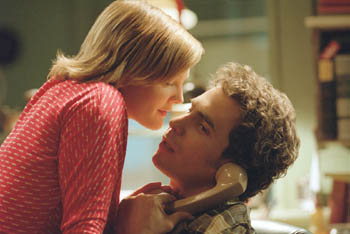![[Metroactive Movies]](/movies/gifs/movies468.gif)
[ Movies Index | Show Times | Santa Cruz Week | SantaCruz Home | Archives ]
Gong Smoke
'Confessions of a Dangerous Mind' riffs on game-show producer Chuck Barris' weird memoir
By Richard von Busack
Thomas Carlyle, essayist and idol of the television producer Chuck Barris, wrote, "A well-written Life is almost as rare as a well-spent one." Only Barris--godfather of The Gong Show--knows whether or not he spent his life well. But his untrustworthy memoir, Confessions of a Dangerous Mind, has been a beloved cult book long in search of a movie. As the subject of George Clooney's debut as director, Confessions of a Dangerous Mind is the essential cult movie: an easygoing entertainment, likable and forgettable, as hard to take seriously as Auto Focus but more agreeable. It's better seen under the influence of something or other, so that its empty spaces and long length aren't conspicuous.
In his memoirs, Barris claims that he had augmented his notorious career as a producer of The Dating Game, The Newlywed Game and The Gong Show with covert wet-work as a U.S. government assassin overseas. He claimed that he killed some 30 people for his country; this body count was responsible for his withdrawal from the public eye. Still, now that the Cold War's over, Barris' truly deathless achievement was being a pioneer in the field of television you can watch and feel superior to, particularly the popular practice of taking used-up celebrities, putting them in a jar and making them fight.
Barris' "biography" is adapted by Charlie Kaufman, but it seems to be Kaufman's fictional Adaptation twin brother Donald's posthumous work: action/adventure plot points, blood and a big finale, just like Donald Kaufman's script for The Three. Julia Roberts swans around as a femme fatale in Cold War Helsinki; Clooney is amusing in a no-nonsense G. Gordon Liddy mustache; and the always perky Drew Barrymore plays a peace-sign-flashing hippie. The minor quality of the film is catalyzed by the actor who plays Barris: Sam Rockwell. By now, it should be apparent now that Rockwell really can't nail down an entire movie and is better off as a supporting actor. Despite the celebs and the retro settings, Clooney's postmodern imagination of a bad spy film looks, unsurprisingly, almost exactly like a bad spy film. While I've got an unusually high tolerance for bad spy movies, I prefer the more cosmic bad-spy film Kafka by Clooney's clearest influence, Steven Soderbergh.
Barris, on publicity tours today, is still tacitly standing behind his book. Good for him for telling the truth and shaming the devil. Is it also true that Merv Griffin has his own nuclear device? Barris evokes nostalgia for the looser days of the 1970s. Now, even retired television producers are too cautious of their "legacies" to go around telling dubious stories that make them look insane. However, there's a tragic side to Barris' story. One of Errol Flynn's last comments was "I wanted people to take me seriously, but I never gave them a reason to do it." In interviews, Barris seems to have this special kind of melancholy. Kaufman (or perhaps Kaufman and Kaufman) only skimmed Barris' darkness. After this film, we still don't really understand the essence of why Barris would decide to tell this story or how it works as the metaphor for the guarded, duplicitous life of an entertainer.
Copyright © Metro Publishing Inc. Maintained by Boulevards New Media.
![]()

Gongster of Love: Sam Rockwell is TV producer Chuck Barris (shown here with Drew Barrymore) in George Clooney's directorial debut.
Confessions of a Dangerous Mind (R; 113 min.), directed by George Clooney, written by Charlie Kaufman and Chuck Barris, photographed by Newton Thomas Sigel and starring Sam Rockwell, George Clooney and Julia Roberts, opens Friday at the Nickelodeon.
From the January 22-28, 2003 issue of Metro Santa Cruz.